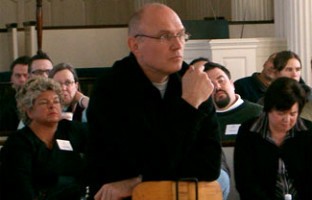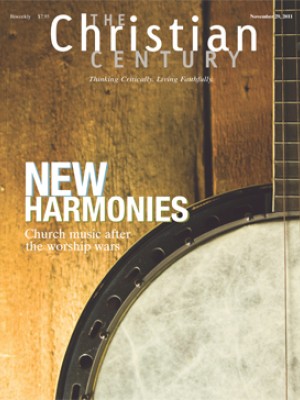Two faiths, one God? Miroslav Volf meets evangelical critics: Miroslav Volf meets evangelical critics

Yale theologian Miroslav Volf believes that Christians and Muslims worship the same God. On November 3 he took that argument to Gordon-Conwell Theological Seminary, an evangelical hub, and found that few were persuaded by his argument.
Volf drew large crowds of admirers on the campus in South Hamilton, Massachusetts, but audience members challenged the thesis put forward in his 2011 book, Allah: A Christian Response. For many of them, accepting Volf's stance would mean renouncing core beliefs.
"If I believe that Jesus Christ is God, then I can't deny that particular aspect of who God is," said Curt Kenney, an M.Div. student seeking ordination in the Presbyterian Church in America. "Muslims deny that Christ was God and that he was resurrected. I don't know how you get around that."
Read our latest issue or browse back issues.
Volf made his case in a keynote address, which was followed by a faculty panel and conversation with students. He framed his "same God" argument as a type of "political theology," not as a statement on what's required for salvation.
In Volf's view, Christians and Muslims agree on key claims about God: that God is One, that God is the Creator, distinct from the creation, and that God is the giver of moral codes found in the Ten Commandments. Because Christian and Muslim claims about God's nature and attributes bear much (though not complete) similarity, Volf contended, they may affirm that they worship the same God, albeit in different ways. Doing so opens doors to much-needed cooperation in today's interconnected world.
"If [Christians and Muslims] worship two different gods, two incompatible gods, I think the consequence is that they inhabit two incompatible moral universes," Volf said. "Consequently, they will never be able to agree on moral terms on what it means to live well under a common roof."
Gordon-Conwell ethicist John Jefferson Davis observed that this argument can be hard to sell to evangelicals. "Part of your intended audience is conservative Protestant evangelical Christians here, who in many cases have negative attitudes toward Islam," Davis said. "In many mainline Protestant denominations, [the notion that] we all worship the same God is obviously true, almost without debate. But in a context like this, it is not without debate."
Volf tried to assure listeners that affirming a common God doesn't necessarily undercut efforts to evangelize. It could, he argued, even create settings in which more Muslims would choose to follow Christ as Lord and Savior.
"Any environment in which there is no hostility is also a good environment for evangelism," Volf said.
Students, faculty and local pastors listened politely, then asked questions. In hallways afterward, they offered reasons why they can't affirm that Christians and Muslims worship the same God.
"At stake is the gospel," said student Andrew Kerhoulas. "If you are saying to a Muslim, 'See there is common ground between us, and then there will be peace,' essentially you have nullified the need for the gospel . . . You're saying that the gospel doesn't matter in order to have a relationship with God."
Volf pushed back on the notion that Muslims must worship a different God because they don't regard Christ as divine. He asked rhetorically: Do Jews also worship a different God, since they too don't see Jesus as God incarnate? To say so would be heretical, Volf said, since Christianity has long affirmed that Hebrew scripture points to God. To use the same argument to exclude the Muslim God would be equally baseless, he said.
Not everyone was persuaded. Some insisted that even though Hebrew scripture is Christian scripture, those who lack faith in Jesus Christ—whether Jewish, Muslim or atheist—still aren't right with God.
"I took issue with [Volf's] tying together Jews and Muslims, because we need to evangelize Jews," said student Will Anderson. "Putting Muslims in the same camp as Jews, or saying they affirm what Jews affirm, what door does that open? . . . I want to live peaceably with Muslims not for the sake of peace, but for the sake of [living] in proximity where I can give my life for the gospel of Jesus Christ, so that they may know Jesus Christ."
As the day wore on, some listeners saw merit in his project while others decided Volf was doing a disservice to the faith. Among the skeptics was Nigerian pastor Peter Johnson, who is pursuing a master's degree in Old Testament in order to evangelize Nigerian Muslims, whom he said are more open to reading the Old Testament than the New Testament. He worries that Christians who are weak in their faith will give up in hard times if they assume, using arguments such as Volf's, that following Christ is not necessary in order to be right with God.
"There is life beyond this life," Johnson said. "The hope beyond this life is based only on relationship with Jesus Christ. That is the belief of scripture, and that is my conviction. So if you say you accept Islam, then you affirm something that doesn't offer you rewards after this life, which is dangerous."
Others found Volf's message encouraging. Gordon-Conwell graduate Preston Clarkson plans to relocate soon to the Middle East with his family in order to serve the Arab church. After hearing Volf, he said he believes Christians and Muslims "attempt to worship the same God," and he believes such a charitable understanding helps advance interfaith relations.
"There's only one God, even though we have different understandings, and that's the basis for partnerships," Clarkson said.
Volf allowed that even though both groups worship the same God, not all modes of worship are equally valid.
"What does it mean to rightly worship the right God?" Volf asked. "I think there, the whole question of salvation, soteriology, presence of the Spirit and role of Christ comes rushing in. Rightly worshiping God is to worship in the Spirit, is to come to Allah through Jesus Christ, is to come to God on the basis of being accepted by God through the death of Jesus Christ on the cross."






